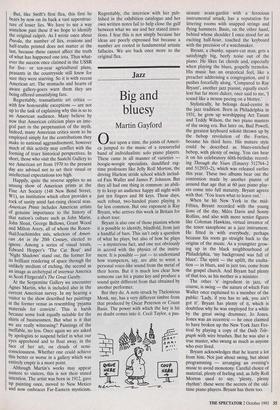Jazz
Big and bluesy
Martin Gayford
Once upon a time, the joints of Ameri- ca jumped to the music of a resourceful band of individualists: solo piano players. These came in all manner of varieties — boogie-woogie specialists, dandified rag- time professors like Jelly Roll Morton, the driving Harlem stride school which includ- ed Fats Waller and James P. Johnson. But they all had one thing in common: an abili- ty to keep an audience happy all night with just ten fingers and 88 keys. These days, such robust, two-handed piano playing is far less common. But one exponent is Ray Bryant, who arrives this week in Britain for a short tour.
Bryant is also one of those pianists whom it is possible to identify, blindfold, from just a handful of bars. This isn't only a question of what he plays, but also of how he plays — a mysterious fact, and one not obviously in accord with the physics of the instru- ment. It is possible — just — to understand how trumpeters, say, are able to wrest a personal voice-like sound from the metal of their horns. But it is much less clear how someone can hit a piano key and produce a sound quite different from that obtained by another performer.
But they do. A note struck by Thelonious Monk, say, has a very different timbre from that produced by Oscar Peterson or Count Basie. The power with which the key is hit no doubt comes into it. Cecil Taylor, a pas-
sionate avant-gardist with a ferocious instrumental attack, has a reputation for littering rooms with snapped strings and flying hammers. Basle, on the other hand, behind whose shoulder I once stood for an exciting half-hour, touched the keyboard with the precision of a watchmaker.
Bryant, a chunky, square-cut man, gets a satisfyingly big, beefy noise out of the piano. He likes fat chords and, especially when playing the blues, gospelly tremolos. His music has an oratorical feel, like a preacher addressing a congregation, and it pushes forcefully along. 'Compared to Ray Bryant', another jazz pianist, equally excel- lent but far more dulcet, once said to me, '1 sound like a mouse peeing on a blotter.'
Stylistically, he belongs dead-centre in the jazz tradition. Born in Philadelphia in 1931, he grew up worshipping Art Tatum and Teddy Wilson, the two piano masters of the swing era. But later on, Bud Powell, the greatest keyboard soloist thrown up by the bebop revolution of the Forties, became his third hero. His mature style could be described as blues-enriched bebop, with plenty of swing. You can hear it on his celebratory 60th-birthday record- ing Through the Years (Emarcy 512764-2 and 512933-2), which was released earlier this year. These two albums bear out the contention made by another pianist of around that age that at 60 jazz piano play- ers come into full maturity. Bryant agrees with that. 'You learn what to leave out.'
When he hit New York in the mid- Fifties, Bryant recorded with the young lions of the day, Miles Davis and Sonny Rollins, and also with more senior figures like Coleman Hawkins, virtual inventor of the tenor saxophone as a jazz instrument. He fitted in with everybody, perhaps because his roots go straight back to the origins of the music. As a youngster grow- ing up in the black neighbourhood of Philadelphia, 'my background was full of blues'. The spirit — the uplift, the exulta- tion — in blues, and in jazz too, come from the gospel church. And Bryant had plenty of that too, as his mother is a minister.
The other 'x' ingredient in jazz, of course, is swing — the nature of which Fats Waller once explained to a member of the public: 'Lady, if you has to ask, you ain't got it'. Bryant has plenty of it, which is doubtless why he was employed for a while by the great swing drummer, Jo Jones. Jones was an eccentric — he once claimed to have broken up the New York Jazz Fes- tival by playing a copy of the Daily Tele- graph with wire brushes. But he was also a true master, who swung as much as anyone who ever lived.
Bryant acknowledges that he learnt a lot from him. Not just about swing, but about programming — arranging an evening's music to avoid monotony. Careful choice of material, plenty of feeling and, as Jelly Roll Morton used to say, 'plenty, plenty rhythm': these were the secrets of the old- time piano players. Bryant has them too.


















































 Previous page
Previous page